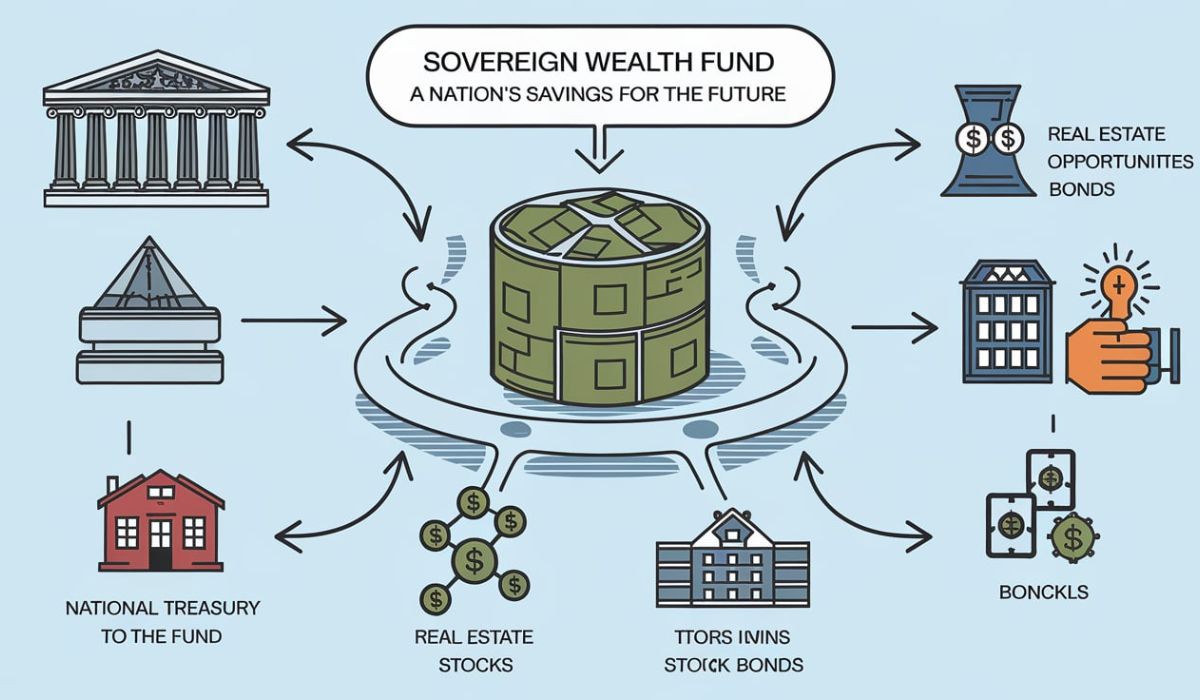Introduction
Have you ever wondered what happens to the extra money a country earns? Instead of letting it sit idle, some nations invest it wisely through Sovereign Wealth Funds (SWFs). Think of it as a nation’s piggy bank, but instead of coins, it holds billions of dollars in investments worldwide.
These funds play a crucial role in stabilizing economies, funding development, and securing wealth for future generations. In this article, we’ll break down everything yo
What is a Sovereign Wealth Fund?

A sovereign wealth fund (SWF) is a government-owned investment fund that manages surplus revenue from sources like oil exports, trade surpluses, or foreign exchange reserves. Instead of keeping this money in cash, countries invest it in stocks, bonds, real estate, and businesses worldwide to generate more wealth.
How Sovereign Wealth Funds Work
Countries set up SWFs to invest excess national income strategically. These funds are usually managed by a government agency or a special investment team. The goal is to grow the country’s wealth over time and provide financial stability during economic downturns.
For example, if a country earns more from oil exports than it needs for its budget, it may store the extra money in an SWF to diversify investments and prepare for the future.
Types of Sovereign Wealth Funds

Sovereign Wealth Funds can be categorized into different types based on their purpose:
- Stabilization Funds – Used to manage economic fluctuations and stabilize the economy.
- Savings Funds – Created to secure wealth for future generations.
- Development Funds – Focused on funding national infrastructure and economic projects.
- Reserve Investment Funds – Aim to generate higher returns on excess foreign reserves.
Why Do Countries Need SWFs?
Sovereign wealth funds are essential for several reasons:
- Economic Stability – Protects a country from financial crises.
- Diversification – Invests in various assets to reduce risk.
- Future Planning – Ensures long-term prosperity.
- Infrastructure Development – Funds important national projects.
Biggest Sovereign Wealth Funds in the World

Here are some of the largest and most influential SWFs globally:
- Norway’s Government Pension Fund Global (GPFG) – Over $1.4 trillion, funded by oil revenues.
- China Investment Corporation (CIC) – Manages China’s foreign exchange reserves.
- Abu Dhabi Investment Authority (ADIA) – A major oil-funded SWF from the UAE.
- Singapore’s GIC and Temasek Holdings – Invests in global markets to grow national wealth.
How Do SWFs Invest Money?
Sovereign Wealth Funds allocate their money into:
- Stocks and Bonds – Investing in multinational companies.
- Real Estate – Purchasing commercial and residential properties.
- Private Equity – Funding startups and growing businesses.
- Infrastructure – Financing bridges, roads, and power plants.
Benefits of Sovereign Wealth Funds
- Protects against financial crises.
- Generates additional income for the government.
- Funds critical national projects.
- Reduces reliance on a single industry (like oil).
Risks and Challenges
Despite their benefits, SWFs face certain risks:
- Market Fluctuations – Investments can lose value during economic downturns.
- Political Interference – Governments may misuse funds for short-term gains.
- Lack of Transparency – Some funds do not disclose their investments.
How SWFs Impact Global Markets
Sovereign wealth funds control trillions of dollars, making them powerful players in global markets. They can influence stock prices, corporate decisions, and even international relations.
Sovereign Wealth Funds vs. Central Banks
While both manage national wealth, their purposes differ:
- Central Banks – Control monetary policy and inflation.
- Sovereign Wealth Funds – Invest surplus funds for future growth.
The Future of Sovereign Wealth Funds
With changing global dynamics, SWFs are diversifying into technology, sustainable energy, and emerging markets. The focus is shifting toward responsible investing and long-term sustainability.
FAQs on Sovereign Wealth Funds
1. What is the main purpose of a sovereign wealth fund?
The primary purpose is to invest a nation’s surplus funds to generate long-term wealth and stability.
2. How do sovereign wealth funds make money?
SWFs make money through investments in stocks, real estate, bonds, and private companies.
3. Which country has the largest sovereign wealth fund?
Norway’s Government Pension Fund Global (GPFG) is currently the largest, managing over $1.4 trillion.
4. Are sovereign wealth funds good for the economy?
Yes, they help stabilize economies, support development projects, and ensure long-term financial security.
5. How can individuals invest in sovereign wealth funds?
Most SWFs are state-owned and not open to individual investors, but their investments indirectly impact global markets where individuals invest.
Conclusion
Sovereign wealth funds are like national savings accounts that help countries prepare for the future. They provide economic stability, fund growth, and ensure wealth for future generations. As the world economy evolves, these funds will continue to play a vital role in shaping global financial markets.
For More Visit, rankshort
